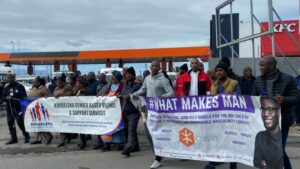A group of civil society organisations led by the Sex Workers Education and Advocacy Taskforce (SWEAT), have launched the #WhoSpeaksForUs campaign. The campaign is aimed at political parties and putting pressure on the government to finally sign into law the decriminalisation of sex work bill.
Organisations who are rallying behind the campaign include: Asijiki Coalition for the Decriminalisation of Sex Workers, Mothers for the Future, Sisonke National Sex Worker Movement, Triangle Project, Inclusive & Affirming Ministries, Imbawula Queer Podcast, Uthingo Network, Coastal Resource Centre, and Gender Equity Unit. Last week, their campaign declared a call to action: “#WhoSpeaksForUs? is not just a question; it is a challenge to the status quo. It is a reminder that leadership should reflect the diversity of the people it serves. Most importantly, it is a commitment to support our advocacies – the full decriminalization of sex work; to stop the war on marginalised bodies; challenging systemic discrimination; and so much more.”
For the past three years, the sex workers’ rights movement has been advocating for the decriminalisation of sex work. In July last year, a march was organised to hand over a memorandum of demands to the Department of Justice and Constitutional Development. In 2022, a scathing report released by sex worker organisations revealed how police were often perpetrators of crimes against sex workers.
The current draft bill was sent for revision, after criticisms that it does not make provision for how changes in the legislation will impact existing regulations in various municipalities.
Connie Mathe, national coordinator at the Asijiki coalition, said, “We’re trying to put pressure on politicians to remember, as they are busy with elections, the promises they have made around decriminalisation of sex work. They must take it as a serious matter. We’re concerned, because no one is speaking for us. It’s just talk, but no action to actually decriminalise sex work. We want the government that will get into power to take us as human beings. Sex workers are dying in numbers, some of them are being violated by police officers. It’s worrying that, government doesn’t realise the seriousness of this. For the past 26 years we have been advocating for it. After these elections, we will keep making noise and push hard. Over 134 organisations are supporting the decriminalisation of sex work. I don’t know why the government is so ignorant.”
Members of the SWEAT theatre group performing at the launch of the report. Photo by Chris Gilili
Is there political will to decriminalise sex work?
Spokesperson for SWEAT, Megan Lessing told Elitsha that the bill that was published in 2022 was found to be unconstitutional. “We don’t want the bill to over-regulate sex workers, because it becomes an infringement. We want to balance the needs of the sex workers, without infringing on their rights. We are still in the redrafting process. The last interaction we had with the Department of Justice, two weeks ago, the minister was still doing consultations,” said Lessing.
She indicated that there seems to be the political will to support and push through the bill. “It seems like there is a commitment to support decriminalisation. However, the end game will be how parliament looks like after the elections. Will there be enough votes, with coalitions and other issues? I guess this will also open up space for more advocacy and lobbying for us.
“Putting things in your manifesto, doesn’t mean you will follow through with them. We are hoping it will be prioritised. In the past, it has been pushed to the back. But the evidence we have proves how much sex workers are suffering. We hope there will be a new commitment for decriminalisation. It would change the lives of sex workers, and allow them to live with dignity and be protected,” said Lessing.
Glynnis Bentham from Observatory who has been a sex worker for 20 years said she voted on Wednesday evening in Cape Town and hopes the party she voted for will prioritise their calls and struggle. “We are not recognised, but these elections look promising. We are a minority group, and for over twenty years we have been campaigning for decriminalisation. Our children and families get affected by this and the ill treatment we suffer while working. I am hoping our efforts have not been in vain.”





